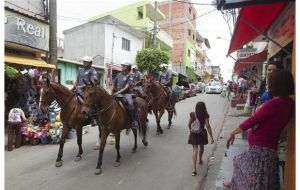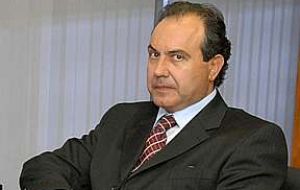MercoPress. South Atlantic News Agency
Street killings and violence in Sao Paulo knock out the state’s head of security
 Mounted police patrol the streets of some of the poor areas of the city
Mounted police patrol the streets of some of the poor areas of the city The head of the Sao Paulo state police who held the post for seven years quit Wednesday amid a surge of deadly violence in Brazil’s largest city and the industrial and financial hub of the country.
Sao Paulo state Governor Geraldo Alckmin said he had accepted the resignation of Antonio Ferreira Pinto and he had been replaced by former state Attorney General Fernando Grella Vieira.
“This wave of violence is a major problem and we will have to work hard to reverse this situation” Vieira told the G1 news website.
Officials said 10 people were killed and 13 wounded in violence between late Tuesday and early Wednesday in Sao Paulo city.
Killings in the city began sharply increasing in September, a month in which 144 people were killed, according to the state Public Safety Department's website. On Wednesday, officials said 176 homicides occurred in October, a 114% jump from a year earlier.
In the first ten months of the year, 1.157 homicides have been committed in the city compared the 870 in the same period last year, a 33% increase.
The website says 94 police officers were slain in the first nine months of the year, most of them gunned down while off duty.
Police have said the killings of police are being ordered by imprisoned leaders of an organized crime group called the First Capital Command in reprisal for a crackdown on the drug trade. Authorities also have said that many of the recent killings appear to be drug-related or involved settling of accounts between rival gangs.
First Capital Command is one of Brazil's most notorious crime gangs. Based in Sao Paulo state prisons, the group allegedly was behind several waves of attacks on police, government buildings, banks and public buses in 2006. Those assaults and counterattacks by police in the slums resulted in at least 175 deaths, including 45 police officers, traffickers and innocents caught in the crossfire.
Sao Paulo state authorities have said incarcerated leaders of the gang suspected of using smuggled cell-phones to order attacks and co-ordinate drug sales, murders of rival gang members and the purchase of weapons would be transferred to a maximum security federal prison outside the state.
Earlier this month, one of the gang's lower echelon leaders was sent to a federal penitentiary in northern Brazil. Others are expected be transferred by the end of November.
Sao Paulo with its 22 million people in the metropolitan area had managed to reduce considerably the rate of homicides between 2000 and 2010 with the exception of 2006, when organized crime paralyzed the city for a week.
Further more in the last twenty years the rate of violent deaths had dropped from 35.27 homicides per 100.000 inhabitants in 1999 to 10.9 for each 100.000 inhabitants in 2011, according to official stats.
With time, persuasion and patience it had become one of the safest cities in Brazil, according to the country’s parameters of violence, and as such was recorded in the official Violence Map, based on official stats. But that changed drastically a couple of months ago.
“We acknowledge the difficulties we are facing and we are going to double efforts”, pledged Governor Alckmin.
But even more worrying has been the spread of violence outside Sao Paulo state, having reached the capital of Santa Catarina, a farming state with a tradition of low violence according to Brazilian standards.
Last week at least 17 buses were torched and six police stations were attacked with heavy gunfire in the capital city of Florianopolis which is also a well known seaside resort in the south of Brazil popular among Argentine and Uruguayan tourists.





Top Comments
Disclaimer & comment rules-

Read all commentsCrime, especially in Sao Paolo, seems to be the only bad news story left in Brazil, at least on mercopress. Hoping that the winning combination of a robust economy and a left government can start to get on top of this problem too...
Nov 23rd, 2012 - 11:57 pm 0Commenting for this story is now closed.
If you have a Facebook account, become a fan and comment on our Facebook Page!